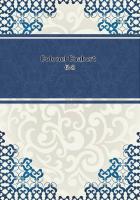Mrs. Assingham however made no more of this, having before anything else apparently a scruple about the tone she had just used. "I quite understand of course that, given her great friendship with Maggie, she should have wanted to be present. She has acted impulsively--but she has acted generously."
"She has acted beautifully," said the Prince.
"I say 'generously' because I mean she has n't in any way counted the cost. She'll have it to count in a manner now," his hostess continued.
"But that does n't matter."
He could see how little. "You'll look after her."
"I'll look after her."
"So it's all right."
"It's all right," said Mrs. Assingham.
(42) "Then why are you troubled?"
It pulled her up--but only for a minute. "I'm not--any more than you."
The Prince's dark blue eyes were of the finest and, on occasion, precisely, resembled nothing so much as the high windows of a Roman palace, of an historic front by one of the great old designers, thrown open on a feast-day to the golden air. His look itself at such times suggested an image--that of some very noble personage who, expected, acclaimed by the crowd in the street and with old precious stuffs falling over the sill for his support, had gaily and gallantly come to show himself: always moreover less in his own interest than in that of spectators and subjects whose need to admire, even to gape, was periodically to be considered. The young man's expression became after this fashion something vivid and concrete--a beautiful personal presence, that of a prince in very truth, a ruler, warrior, patron, lighting up brave architecture and diffusing the sense of a function. It had been happily said of his face that the figure thus appearing in the great frame was the ghost of some proudest ancestor. Whoever the ancestor now, at all events, the Prince was, for Mrs. Assingham's benefit, in view of the people.
He seemed, leaning on crimson damask, to take in the bright day. He looked younger than his years; he was beautiful innocent vague. "Oh well, I'M not!" he rang out clear.
"I should like to SEE you, sir!" she said. "For you would n't have a shadow of excuse." He showed how he agreed that he would have been at a loss for one, and the fact of their serenity was thus made as important (43) as if some danger of its opposite had directly menaced them. The only thing was that if the evidence of their cheer was so established Mrs. Assingham had a little to explain her original manner, and she came to this before they dropped the question. "My first impulse is always to behave about everything as if I feared complications. But I don't fear them--I really like them. They're quite my element."
He deferred for her to this account of herself. "But still," he said, "if we're not in the presence of a complication."
She debated. "A handsome clever odd girl staying with one is always a complication."
The young man weighed it almost as if the question were new to him.
"And will she stay very long?"
His friend gave a laugh. "How in the world can I know? I've scarcely asked her."
"Ah yes. You can't."
But something in the tone of it amused her afresh. "Do you think you could?"
"I?" He wondered.
"Do you think you could get it out of her for me--the probable length of her stay?"
He rose bravely enough to the occasion and the challenge. "I dare say if you were to give me the chance.
"Here it is then for you," she answered; for she had heard, within the minute, the stop of a cab at her door. "She's back."















